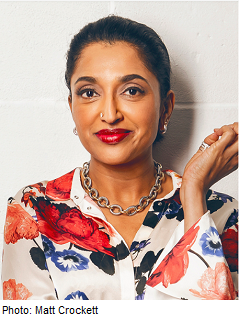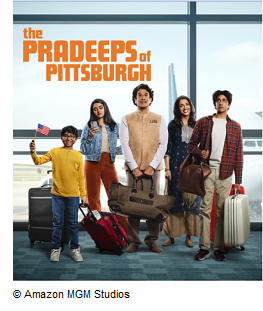
 In many ways,
the character Sindhu Vee plays
in the new Prime Video comedy
series The
Pradeeps of Pittsburgh draws from her own life. Like
Vee, Sudha
Pradeep is a highly-educated, take-charge Indian mother of
three, whose no-nonsense parenting style is both hilarious and
slightly unnerving. And, like Sudha, Vee is fearless.
In many ways,
the character Sindhu Vee plays
in the new Prime Video comedy
series The
Pradeeps of Pittsburgh draws from her own life. Like
Vee, Sudha
Pradeep is a highly-educated, take-charge Indian mother of
three, whose no-nonsense parenting style is both hilarious and
slightly unnerving. And, like Sudha, Vee is fearless.
Twelve years ago, Vee, 55, decided she was done being a soccer mom.
So the former high-flying London-based investment banker took a bold
step and tried her hand at standup. The result? She’s now an
award-winning comedian and writer performing sold out shows across
the United Kingdom, India, and the United States. Since 2020, Vee
has added “actor” to her title, appearing in various British comedy
TV series and making her film debut as the supportive librarian Mrs. Phelps
in the 2022 Netflix adaptation of Roald Dahl’s Matilda
the Musical.
In her latest role, Vee plays Sudha, a neurosurgeon who moves to
America with her husband, Mahesh, and their three children, to
pursue the American dream. And judging by her growing success, Vee
could end up making a name for herself in the U.S., too. Over the
course of eight episodes, viewers watch as two agents with the
Immigration and Naturalization Service try to solve a crime by
interrogating the Pradeeps about their two years in this country.
The result is a hilarious look at assimilation, racism, and the
challenges of raising kids in a foreign culture.
It’s the same type of humor that Vee weaves into her own stand-up
material, using personal stories about her Danish financier husband
and their three teens. (“After 22 years, my husband and I really
don’t have arguments,” she jokes. “We have throwdowns--like MMA
level, marriage martial arts.” And on parenting, she adds, “I was
born in India, so what I consider robust, healthy, high quality
parental discipline…is illegal in this part of the world.”)
We recently spoke to Vee about her rising fame, experiences with
racism and sexism, and her own immigrant story.
You started out as a comedian, and
now you're also an actor and a writer. Did you imagine this life
during your early days as a stand-up?
Absolutely not. I didn't imagine this at all. I didn't imagine that
I would be a stand-up. I was just starting to get used to that, and
then I had opportunities to act. It’s all exciting; it’s all new,
and I'm grateful for all of it. But I did not expect any of it.
How was the transition from stand-up to acting, and do you prefer
one over the other?
It's not a transition because I haven't left one to go to the other.
It’s happening together. I don't have a preference, but I’ve
developed a certain confidence in stand-up just by virtue of having
done it longer. I love acting as much as I've done it, [but] I don't
know that I would prefer it over stand up. I love stand-up. Stand-up
is my home in a lot of ways because I always go back to writing, and
I always go back to being myself. When you act, you're somebody
else, and those are two very different ways of performing.
Acting comes naturally to you. Did you take many acting lessons?
I've never taken an acting lesson. When I was doing Matilda,
the movie, my reps would say, “You probably should talk to an acting
coach.” I had these wild horses coming out of me when I was acting,
but I didn't know how to control them. I didn't know how it was
happening, so I wanted some agency because what if one day I showed
up on set and it didn't happen? My acting coach was fantastic. She
explained a lot of different things to me. We had a few sessions,
and some of the stuff she taught me were about thinking about your
character, and also a lot of very technical stuff, like how to learn
lines, talk to directors, and understand what they want from you.
But with the actual acting, she always said, “Go with your
instincts.”
 Like many comedies about first-generation
immigrants, we laugh at the Pradeeps, but I also found myself
laughing at the ignorant Americans they encounter. Did that appeal
to you, and what else did you like about the script?
Like many comedies about first-generation
immigrants, we laugh at the Pradeeps, but I also found myself
laughing at the ignorant Americans they encounter. Did that appeal
to you, and what else did you like about the script?
Many things in the script appealed to me. The single biggest thing
that struck me was that it was so funny and the jokes landed well.
When I read the script, I laughed out loud. I see a lot of scripts
and I see a lot of comedies, so for me to suddenly spit out my tea
is rare. In terms of appeal to me, The Pradeeps of Pittsburgh
creates a very real world. The show isn’t saying that America is
full of only ignorant people. We know that the show has many other
white Americans who are wonderful. Even their neighbors have a
reason for being how they are. It would not have been appealing to
me if it felt fake or artificial.
Tell us how different your own immigrant story was from the
Pradeeps?
I didn't move to the West as a child. I came when I was working in
my 20s. I was a teen in India where it was much more strict, and you
could not be rebellious.
But were you rebellious?
I was rebellious, but I wore what my mother said, and I did what she
said.
Did any of the experiences of playing Sudha resonate with
you on a personal level?
My experience that sort of matches with Sudha is that I came to the
West with a degree and a job, and I was very educated for that job.
I had a lot of confidence. Sudha is very confident because she's
highly educated. She comes from a democratic country. She speaks
English. I understand that. That's how I felt when I came to work
here. I didn't come here because I was running away from [something]
terrible. My parents were surprised. They were like, “Why are you
staying in the West? Why don't you come home?” And I was like, “Man,
I don’t want an arranged marriage, so I'll stay out long enough that
I become too old for my mother to find me a nice boy.”
A lot of your stand-up material focuses on your husband and
kids. How difficult is raising children with parents from two very
different cultures?
I have teenagers, and they're rebellious in a way that I find
incomprehensible. I find it disrespectful, but you’ve gotta change
with the times.
I also have friends who are married to Indians, and the best
marriages are the ones where everyone has really gone through it and
chose to stay together. Marriage is tough. Marriage is fun. Marriage
is what it is. When you choose to create a family with someone from
a culture very different from yours, you take on the loss of your
sense of self. [At first], you don't know that because when you fall
in love, it's like, “Oh my God, you see me in a way that no one else
has seen me.” Then you have kids, and you're like, “I am invisible
to this man.” And that is just part of what it is.
You even joke about the arguments.
We have arguments, but the more important point is that you parent
together, as my husband and I do. The way he is with the kids drives
me mad, but I live in the West, and I think it's more sane for the
kids. There are so many things I would have lost my mind over and
worried about, and he's like, “It’ll be fine.” And guess what? It
was fine.
But when my kids are doing very well, that's thanks to me. It was
because I said, “You're gonna wake up and do your homework. You're
not gonna lie around!” This is not to say that my husband lets them
lie around. He’s just more relaxed. It isn't easy, but does that
mean that I wish it were any other way? I don't think so.
You make it all look so easy, but were there ever times when you
suffered from Imposter Syndrome?
I had Imposter Syndrome. I always wanted to be a professor, but then
I quit my PhD and moved into finance, where I didn't know anyone. No
one in my family had been in finance. It was such a different
lifestyle. But I needed to do it because I had a visa and being
financially independent was very important to me. I didn't want to
go from my father's home to my husband's home. I learned how to do
the job, but I always wondered, “Is this really for me?”
So you quit your job to become a full-time mom?
I always wanted to be a mom, but I was so bored being at home with
the kids. No offense, but I was like, “This cannot be it.“ It drove
me mad. I come from a very Indian background and all of our mothers
were around, but they weren't tending to us all the time. I had
friends who had kids my age, and we both stopped working. The
minutiae of their children's lives filled up their whole day. I was
like, “I just want to watch Law
& Order.” That's when I realized how much I felt
alone because I didn't have my cousins or a group of other Indian
women who thought like me to hang out with. I had lots of friends,
and they were very supportive, but they were obsessing about whether
the bananas were organic.
Have you ever experienced racism, sexism or any other -isms?
They have swirled around me. I have been fortunate to not have
something come full frontal at me, racism-wise. But I was also
around international environments, like universities and investment
banking--places full of Indians because of math, so I wasn't in the
kind of communities where I was that different. There were other
people like me around.
Sexism is kind of just in the ether, and you see it everywhere. But
it hasn’t come at me in a way that was like, “Oh, my God, this is
happening just to me in this particular environment.” But it's
always in the air. You have to be mindful of it. When there is a
situation where you progress to a point that you have a voice, then
you want to say something to clear the way for women who are younger
than you.
Didn’t you say that when you worked as a bond trader, your
colleagues called you “Ruby Murray,” which in English Cockney
rhyming slang stands for “curry”?
Ruby [Murray rhymes with] curry, because I'm Indian. But on the
trading floor everyone had a name; they didn't have it just for me.
Coming from India and not having been raised here, I didn't have the
wounds that a child would have, so those things kind of bounced off
me. I had a kind of expat mentality rather than a first-generation
immigrant mentality. That was why it didn't bother me.
Do you think something like that would bother your kids?
I know it would bother my kids. If someone called them that, they
would lose their minds. I'm not saying that I was right. I'm just
saying I could flick it off because I didn't grow up where I looked
different. I went to an American school as a child in the
Philippines during the 80s. We were there for some years, and all
the kids in the class were white, and they called me “Blackie.” I
didn't like it at all. I went to my mother, and I asked,” Why do
they call me “Blackie”?” And she said, “Because they're very fair,
and you're very dark. What is your problem? Go tell them they’re
stupid.” That's a very immigrant stance to take.
What advice do you have for women, particularly Asian women, about
overcoming their fears and just going for it, like you did?
Resilience. We have it in our cultures. Think about it: resilience.
_______________________________
*Edited for length and clarity
Images provided by Amazon MGM Studios

